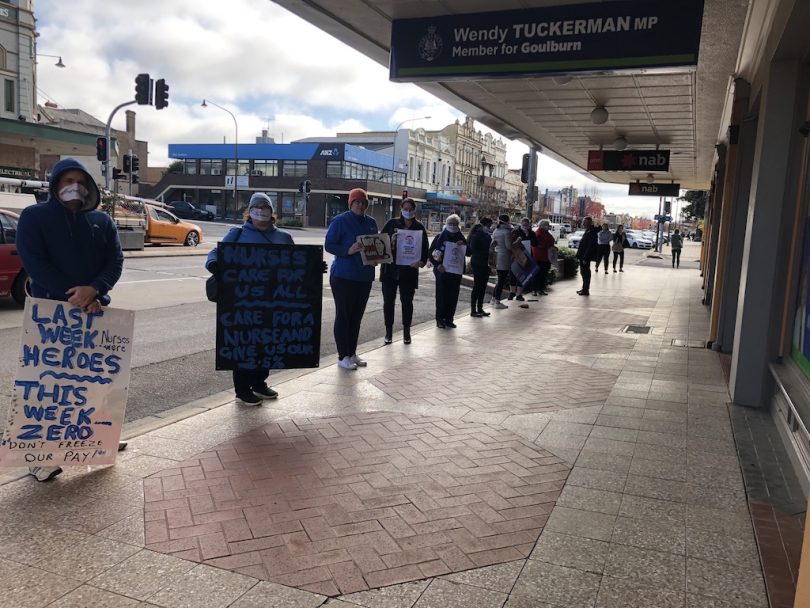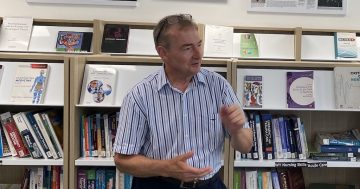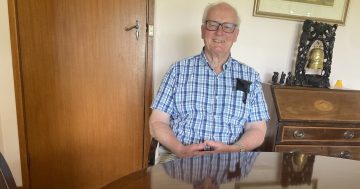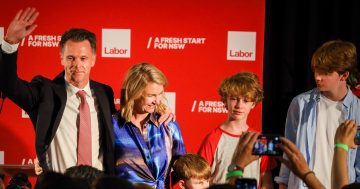
Nurses and their supporters protesting in Auburn Street, outside Member for Goulburn Wendy Tuckerman’s office. Photo: NSW Nurses Association.
One Sunday afternoon in the waiting room at Goulburn Base Hospital’s emergency department a man answered the same three questions from his bewildered son. Where’s his girlfriend? Where’s his best mates? What just happened? For the umpteenth time, this harried father answered all three: she’s at the rugby match; his mates are playing; and he left the field at Wexted Oval severely concussed.
“You want to hold up a sign with each answer on it because he asks the same questions,” said the tall, smiling nurse in the triage room, dropping an enormous wave of relief over the father. “His memory will return. This is normal; he is going to be alright.”
More than anything else, her calm demeanour quelled his worst fears.
All of us have an episode in hospital to relate, whether personal or from accompanying a loved one. When the normality replaces the crisis, the hospital’s polished floors, antiseptic smells, weird meal times and briskly efficient nurses fade from our thoughts.
But we have almost daily reminders from NSW Premier Gladys Berejiklian, on morning television surrounded by senior public servants and her health minister basking in our gratitude for steering the state through the COVID-19 pandemic.
All the state premiers have made this crisis about themselves. Nurses are rarely mentioned at press conferences.
In the base hospital’s emergency department’s waiting room a window on reality opens abruptly. A mother admonishes her adult son in his boiler suit. He is groaning loudly, his hands rubbing his painful head with a blinding headache.
“Well, that’s what you get for working without a welding mask,” she says.
Nurses are on the job from 7.30 am, or from 2.30 pm for the second shift, or 9.30 pm for the third shift, to continue their non-stop work inserting cannulas, catheters, feeding an old man dying of pancreatic cancer, wiping stinking vomit from their shirt after reviving someone coming out of anaesthesia, or reassuring that apprentice welder.
The other reality is our nurses are angry. Many feel undervalued.
They have come through the bushfires and a pandemic and are hanging out for a small pay rise. They want 2.5 per cent. They have been offered a miserable 0.3 per cent.
“It’s a kick in the teeth,” one of their few advocates says. “We’re pissed off,” says another.
For some nurses, the rise represents an increase of just 7 cents per hour, or $2.90 per week.

Nurses have been offered a pay rise of just 0.3 per cent. Photo: NSW Nurses Association.
In Goulburn, between 500 and 600 public sector and private sector nurses are waiting. The private sector nurses know they will not receive one cent more than their public-sector colleagues. That’s how the system works.
Nurses’ years of training for diploma of nursing qualifications and postgraduate studies mean many high-needs patients, once treated in intensive care, are now in general wards. The workload has increased along with the transition.
In regional areas, where it’s harder to recruit, demands continue to rise. As one nurse in a NSW South Cost hospital observed: “I’m now doing more with less, for less.”
Goulburn District Unions president Anna Wurth points out the local economy falls behind when wages lag because of public servant numbers in the local workforce.
“Nurses, midwives, cleaners, teachers, prison guards and TAFE teachers are essential, and they live and spend in the local economy in Goulburn, creating more jobs,” she says.
“This is more than just nurses. The hospital relies on cleaners, pathologists, doctors, physios, social workers and many others. These are essential to keeping the hospital working and their pays are affected by these economically destructive decisions. This is about ideology, not about the community of Goulburn.”
Nurses’ attention to hygiene has became even more critical during the COVID-19 pandemic, yet their personal protective equipment is either missing or inadequate. Lack of empathy from decision-makers has riled them.
NSW Premier Gladys Berejiklian, in a moment of poor judgement, ignored self-isolation rules to traipse into the NSW Parliament’s lower house chamber while awaiting results of a COVID-19 test, safe in the knowledge that in the worst-case scenario, her care would be the best available.
The 2020 budget boasts of a strong economy, and a $3 billion spend on health. A dazzling array of statistics, infrastructure spending figures and spin on the government’s website shows it knows the price of everything.
And the value of nothing.
















